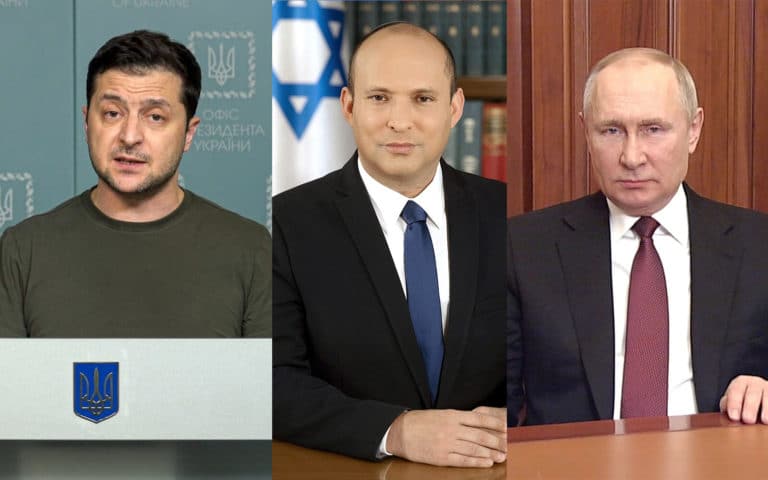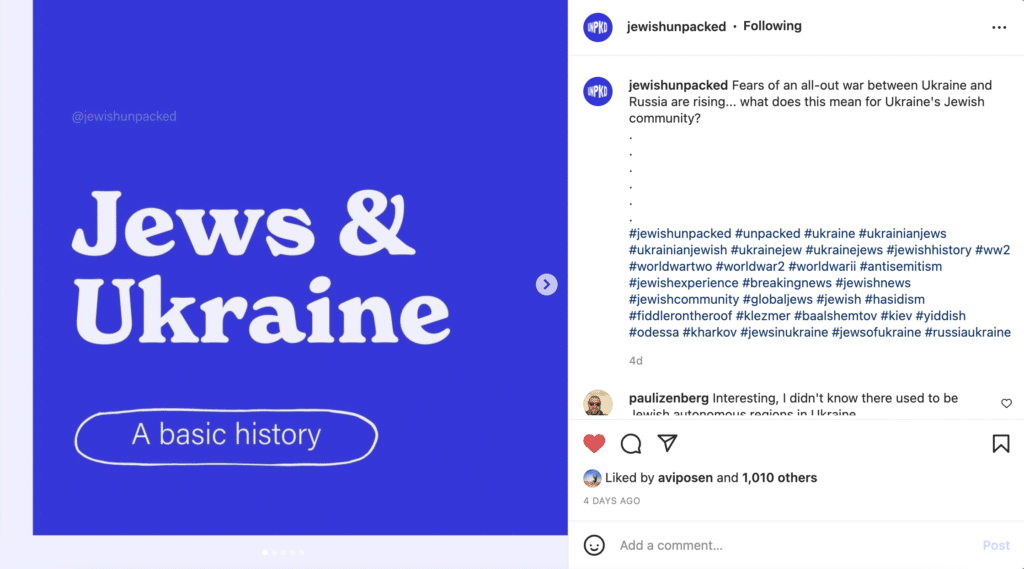
We’re curious…
On the day Russia invaded Ukraine, Israeli Prime Minister Naftali Bennett and Foreign Minister Yair Lapid made two very different public statements.
While Lapid condemned the “Russian attack on Ukraine,” calling it “a serious violation of the international order,” Bennett avoided condemning the invasion or even mentioning Russia at all. Instead, he expressed sympathy for Ukrainians and pledged to offer humanitarian support.
Sources in both the Prime Minister’s office and the Foreign Ministry said that these statements were coordinated, and “were not contradictory but complementary,” multiple Israeli media outlets reported.
As the invasion of Ukraine continues, Israel’s response is still dissonant. On Monday, Lapid said Israel would vote in favor of a U.N. General Assembly resolution condemning the Russian invasion of Ukraine, stating, “Israel has been and will be on the right side of history. Those are our values.”
But at a Sunday cabinet meeting, Bennett told his government ministers to “keep a low profile” on the war, and Interior Minister Ayelet Shaked said that “the Israeli interest is to remain silent,” Israeli media reported.
But the Israeli government has wanted to get involved in at least one way. Last Friday, Ukrainian president Volodymyr Zelensky asked Bennett to mediate peace talks between Russia and Ukraine. Two days later, Bennett called Putin to offer Israel’s mediation, but Putin reportedly turned down the offer.
(Watch our TikTok video on Ukraine’s Jewish president, Volodymyr Zelensky.)
The different statements show the diplomatic tightrope Israel is currently walking with respect to Russia, Ukraine and the U.S. As Barak Ravid of Axios wrote, Israel is attempting to “balance aligning itself with its biggest ally, the U.S., while maintaining good relations with another superpower, Russia, with which it has an important security relationship.”
With Israel caught in a diplomatic and moral quandary, one of the few countries that has good relations with both Ukraine and Russia, we wanted to delve deeper into Israel’s “balancing act” and the debate over how the Jewish state should respond. Why hasn’t the Israeli government formally condemned the Russian attack, and should it take a stronger moral stand?
Why hasn’t the Israeli government formally condemned the Russian attack?
According to David Horovitz of The Times of Israel, Israel’s “every instinct and principle impels it to condemn Russia’s attempt to quash Ukraine.”
Israel identifies with Ukraine on grounds of shared values and experience, according to Horovitz.
“Israel knows it should be standing in solidarity with the brave underdog, the young democracy battling desperately to resist a mighty autocratic force that never accepted its legitimacy and now hopes to achieve its elimination,” he wrote. “After all, that’s been pretty much Israel’s reality throughout our modern existence.”
But Israel’s leadership has been balancing the “moral imperative” to condemn Putin with legitimate security concerns, he continued. First, there is a concern for “the well-being of Russia’s still-sizable Jewish community were [Israel] to take a clear public stance against Vladimir Putin.”
Second, Israel fears alienating Putin with respect to Iran, Horovitz wrote. Russia maintains a presence in neighboring Syria, but allows Israel to carry out airstrikes against Iranian and Syrian military targets. (Russia has maintained an active presence in Syria since 2015, to support the regime of Syrian President Bashar Assad.)
Daniel Gordis explained Israel’s need to maintain a healthy working relationship with Russia:
“As Iran seeks to get its arms into Syria…Israel bombs Syria and destroys those it can, almost at will. Israel has bombed Syria hundreds of times in the past few years… Still, though, there are limits on what Israel can do there, not because of Syria, but because of Russia, which also occupies that airspace. If Israel crosses Russia, Russia puts an end to Israel’s actions there. And the arms then flow to Syria and Lebanon, essentially positioning Iran right on Israel’s border.”
To sum it all up, Israel wants to be on the right side of history and wants to side with Ukraine, but it also does not want to risk its own security by speaking out against Putin. This has resulted in what Lazar Berman from The Times of Israel called Israel’s “good cop, bad cop” dynamic, with Lapid condemning the attack and Bennett avoiding any direct condemnation.
I do not envy Israeli leaders, who must balance Israel's instinctive solidarity with fellow democracy Ukraine, its geopolitical considerations closer to home, and its concern for the large Jewish communities in both Ukraine and Russia. This will be a difficult balancing act.
— Avi Mayer (@AviMayer) February 24, 2022
It remains to be seen if Israel will maintain that approach as casualties mount, including the death of Israeli citizen Roman Brodesky, and the world unites against Putin. Israel’s announcement yesterday that it will vote in favor of the U.N. resolution condemning Moscow signals that its stance could be shifting.
Should Israel take a clear moral stand?
Meanwhile, a debate emerged within Israel over the country’s stance and whether the Jewish state ought to clearly condemn Putin. Should Israel prioritize its morals over its interests, or is it actually in Israel’s best interest to condemn Putin?
Another way to look at this is: can Israel function as a mature country taking a firm moral stance, or must Israel be a vassal state of powers? The biggest superpowers have the luxury of taking independent stances, but Israel must take into account its relationships with other states.
One person urging Israel to “take a clear moral stand” against Putin’s invasion of Ukraine is the Ukraine-born human rights activist Natan Sharansky, who called the attack a challenge to “all basic principles of the free world.”
In an interview Monday with The Times of Israel, Sharansky acknowledged that “there are genuine considerations of realpolitik” that Israel needs to take into account. “I hope it takes a clear position in spite of that,” he added.
Putin “is seeking to change the entire post-World War II order in which your stronger neighbor cannot take away your freedom,” he added. “The only thing that can stop him is the absolute solidarity of the free world.”
The Haaretz editorial board agreed, writing, “Israel can no longer bury itself in silence. [Ukraine] is deserving of Israel’s sympathy and moral support.”
The editorial board acknowledged that the Israeli government’s “apprehension is understandable,” but concluded that “Bennett and his senior ministers must not be blinded by their close ties with Putin. Israel must choose the right side of history.”
Many Israeli citizens agreed. Over the weekend, thousands of Israelis, including many of Ukrainian descent, demonstrated in Tel Aviv to express their support for Ukraine, as the City Hall was lit with the blue and yellow Ukrainian flag.
Tel Aviv City Hall honoring Ukraine
— Aviva Klompas (@AvivaKlompas) February 25, 2022
💙🇺🇦💛 pic.twitter.com/lgMkuEcgGt
But Eran Lerman, vice president of the Jerusalem Institute for Strategy and Security, pushed back on the notion that speaking out against Putin is the only “moral” choice.
“If in two years from now we sit under a barrage of Iranian-supplied high-accuracy rockets killing our citizens because we’ve been denied the capacity to prevent this from happening, that’s also a moral question,” he said, adding, “The question of consequences is also a moral question.”
Meanwhile, Meir Ben-Shabbat, visiting senior research fellow at the Institute for National Security Studies, argued that “Israel does not need to prove what worldview, which ideological outlook, and which values it is close to” because “this is quite clear to everyone.”
“Everyone is aware” of the special relationship between Israel and the U.S., Ben-Shabbat argued. “Along with this, Israel has additional interests it must take into consideration.”
Meanwhile, could Israel be playing both sides of the war on behalf of Ukraine? Journalist Lazar Berman argued that Israel maintaining working ties with Russia could ultimately be advantageous to Ukraine.
“If Putin does want a mediator at some point — and it may well be that there is no endgame other than negotiations — Israel is one of the few options that both sides would be comfortable with,” he wrote.
If Israel were to mediate talks, and successfully broker a peace agreement, this would also be a major diplomatic victory for Israel. “If successful, it would bestow prestige and status on the state, and perhaps even a Nobel Peace Prize to the chief mediator,” Herb Keinon of The Jerusalem Post wrote.
Last week, Ukrainian Ambassador to Israel Yevgen Korniychuk told CNN, “Our president believes Israel is the only democratic state that has great relations with both Russia and Ukraine and that could be used in order to facilitate those negotiations.”
Bonus: Ukraine’s Jewish community
Ukraine has a complicated past when it comes to its treatment of the Jewish community. It was the birthplace of the Hasidic movement and Klezmer music and has a rich legacy of Yiddish culture, but it also has a history of terrible antisemitism. Read more about Jewish life in Ukraine, past and present. Plus, read about why the war in Ukraine feels like (and is) a very Jewish story.

Originally Published Mar 1, 2022 12:02AM EST
